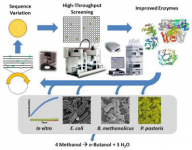Synthetic Pathway for Methanol Conversion

Technology Description:
The University of California, Los Angeles (UCLA) will develop a high-efficiency, synthetic metabolic pathway that transforms methanol into n-butanol, a liquid fuel that can be used as a direct substitute for gasoline due to its high energy density. In nature, the process by which organisms that feed on methane convert it into fuel is inefficient, resulting in a substantial loss of carbon in the process. UCLA’s synthetic metabolic pathway would oxidize the methanol into formaldehyde, convert the formaldehyde into an essential metabolite known as acetyl-CoA, and then condense the acetyl-CoA into n-butanol. In the end, UCLA’s pathway would transform 4 parts methanol into 3 parts water and 1 part n-butanol while achieving 100% carbon conversion. UCLA will also attempt to move this synthetic metabolic pathway into organisms capable of biological methane activation to create a complete methane to n-butanol microbial production system.
Potential Impact:
If successful, UCLA’s technology will achieve 100% carbon conversion of methanol to n-butanol, and could easily integrate with advances in upstream methane activation.
Security:
An improved bioconversion process could create cost-competitive liquid fuels significantly reducing demand for foreign oil.
Environment:
This technology would allow for utilization of small-scale remote natural gas resources or methane and carbon rich gas residues for fuel production reducing harmful emissions associated with conventional fuel technologies.
Economy:
Expanding U.S. natural gas resources via bioconversion to liquid fuels could contribute tens of billions of dollars to the nation's economy while reducing or stabilizing transport fuel prices.
Contact
ARPA-E Program Director:
Dr. Marc von Keitz
Project Contact:
Mr. Tony Wu
Press and General Inquiries Email:
ARPA-E-Comms@hq.doe.gov
Project Contact Email:
idealgas314@gmail.com
Related Projects
Release Date:
03/15/2013
